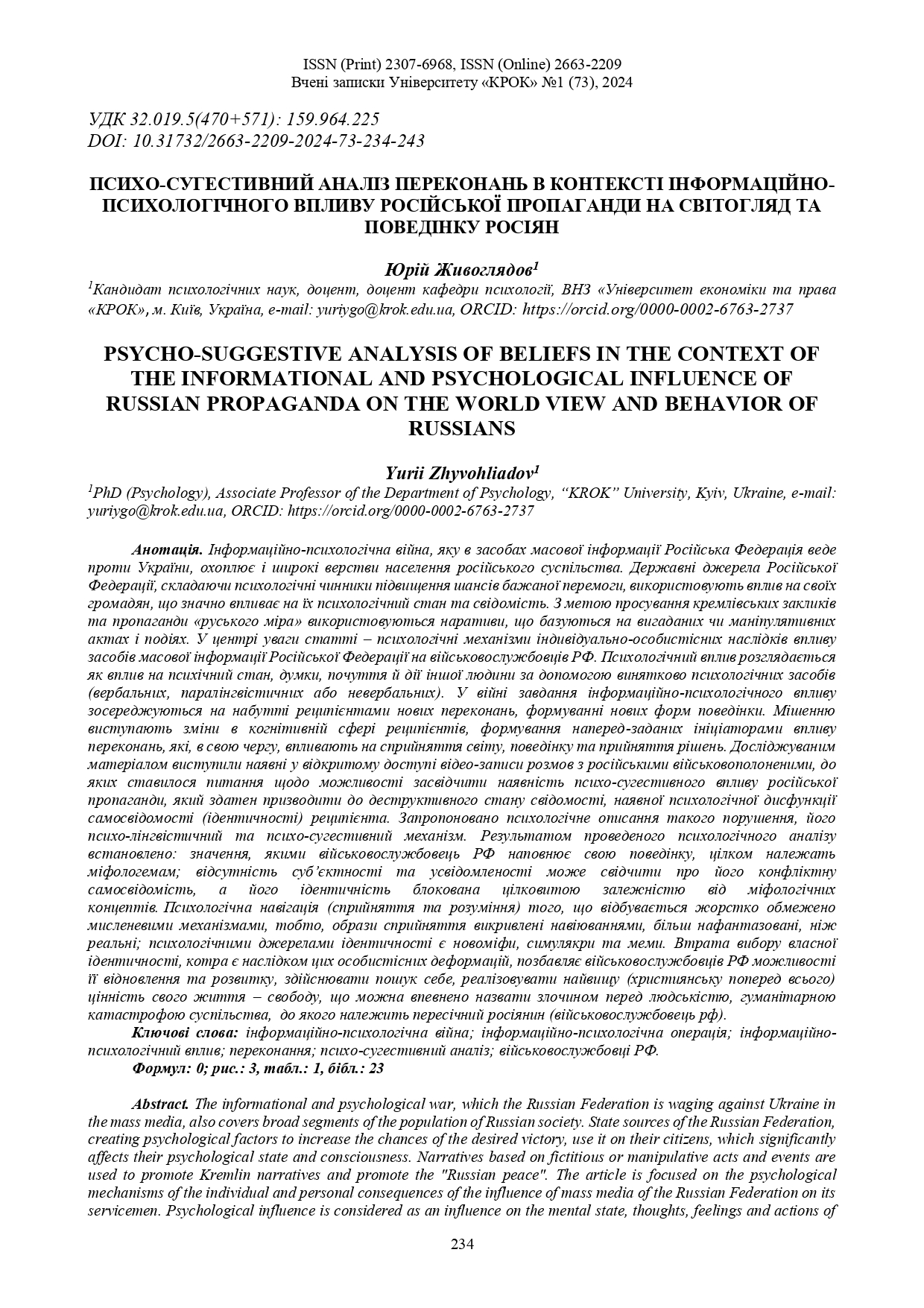PSYCHO-SUGGESTIVE ANALYSIS OF BELIEFS IN THE CONTEXT OF THE INFORMATIONAL AND PSYCHOLOGICAL INFLUENCE OF RUSSIAN PROPAGANDA ON THE WORLD VIEW AND BEHAVIOR OF RUSSIANS
DOI:
https://doi.org/10.31732/2663-2209-2024-73-234-243Keywords:
information and psychological warfare, informational and psychological operation, informational and psychological influence, belief, psycho-suggestive analysis, servicemen of the Russian FederationAbstract
The informational and psychological war, which the Russian Federation is waging against Ukraine in the mass media, also covers broad segments of the population of Russian society. State sources of the Russian Federation, creating psychological factors to increase the chances of the desired victory, use it on their citizens, which significantly affects their psychological state and consciousness. Narratives based on fictitious or manipulative acts and events are used to promote Kremlin narratives and promote the "Russian peace". The article is focused on the psychological mechanisms of the individual and personal consequences of the influence of mass media of the Russian Federation on its servicemen. Psychological influence is considered as an influence on the mental state, thoughts, feelings and actions of another person using exclusively psychological means (verbal, paralinguistic or non-verbal). In war, the tasks of informational and psychological influence are focused on the acquisition of new beliefs by the recipients, the formation of new forms of behavior. The target is to change the cognitive sphere of the recipients, to form the influence of beliefs predetermined by the initiators, which, in turn, affect the perception of the world, behavior and decision-making. Publicly available video recordings of conversations with Russian prisoners of war served as the research material, regarding which the question was raised about the possibility of testifying the presence of psycho-suggestive influence of Russian propaganda, which is capable of leading to a destructive state of consciousness, existing psychological dysfunction of the recipient's self-awareness (identity). A psychological description of such a violation, its psycho-linguistic (psycho-suggestive) mechanism is proposed. As a result of the conducted psychological analysis, it was concluded: the meanings with which the Russian serviceman imbues his behavior are completely mythologized; the lack of subjectivity and awareness may indicate his conflicted self-awareness, and his identity blocked by total dependence on mythological concepts. Psychological navigation (perception and understanding) of what is happening is strictly limited by mental mechanisms, which means that the images of perception are distorted by suggestions, more fantasized ones than real; psychological sources of identity are neomyths, simulacra and memes.The loss of the choice of one's own identity, which is a consequence of these personal deformations, deprives servicemen of the Russian Federation of the opportunity to restore and develop it, to search for themselves, to realize the highest (Christian above all) value of their life - freedom, which can be confidently called a crime against humanity, a humanitarian catastrophe of society, to which the average Russian (military serviceman of the Russian Federation) belongs.
Downloads
References
Вепринцев, В., Манойло, А., Петренко, А., Фролов, Д. (2005). Операції інформаційно-психологічної війни. URL: http://psyfactor. org/psyops/psyops4.htm
Гребньов, Г. (2023). Інформаційний аспект гібридної війни росії проти України. Український інформаційний простір, 1(11), 107–118. doi: 10.31866/2616-7948.1(11).2023.279598
Гуляєва, А. (2023). Соціально-психологічні особливості системи переконань особистості в кризових умовах. Автореферат дисертації на здобуття наукового ступеня кандидата психологічних наук. К. Прінт Квік, 21. URL:https://snu.edu.ua/wp-content/uploads/2023/03/gulya-va-a.s.-avtoreferat .pdf
Дані (відео та транскрибація), (військовополонені). Доступ через: https://drive.google.com/drive/folders/107LXqVniEmzQXAtSyEWzCEJe9XdSwThg?usp=drive_link
Дані (відео та транскрибація), (перехоплення). Доступ через: https://drive.google.com/drive/folders/1ezHj9DLdSjJsUXwIbsA9c6nwk05vKkW9?usp=drive_link
Завгородня, О. (2022). Інформаційно-психологічний вплив на громадян під час загрозливих подій. Габітус, 36, 53-57. URL: http://habitus.od.ua/journals/2022/36-2022/7.pdf
Зеленін, В. (2018). По той бік правди: НЛП як зброя інформаційно-пропагандистської війни. К.: Люта справа, 384.
Психологічна енциклопедія. Переконання. Український психологічний ХАБ: веб-сайт. Дата звернення 15.11.2023. https://shorturl.at/bfnDS
Почепцов, Г. (2015). Сучасні інформаційні війни. К.: Києво-Могилянська академія, 497.
Твердохліб, Ю. (2019). Теоретичні підходи до дослідження інформаційно-психологічних операцій. Epistemological studies in philosophy, social and political sciences, 2(2), 122-131. http://nbuv.gov.ua/UJRN/ epstphsps_2019_2_2_16
Dilts, R. (2017). Sleight of Mouth: The Magic of Conversational Belief Change. Dilts Strategy Group, 346.

Downloads
Published
How to Cite
Issue
Section
License

This work is licensed under a Creative Commons Attribution-NonCommercial 4.0 International License.

